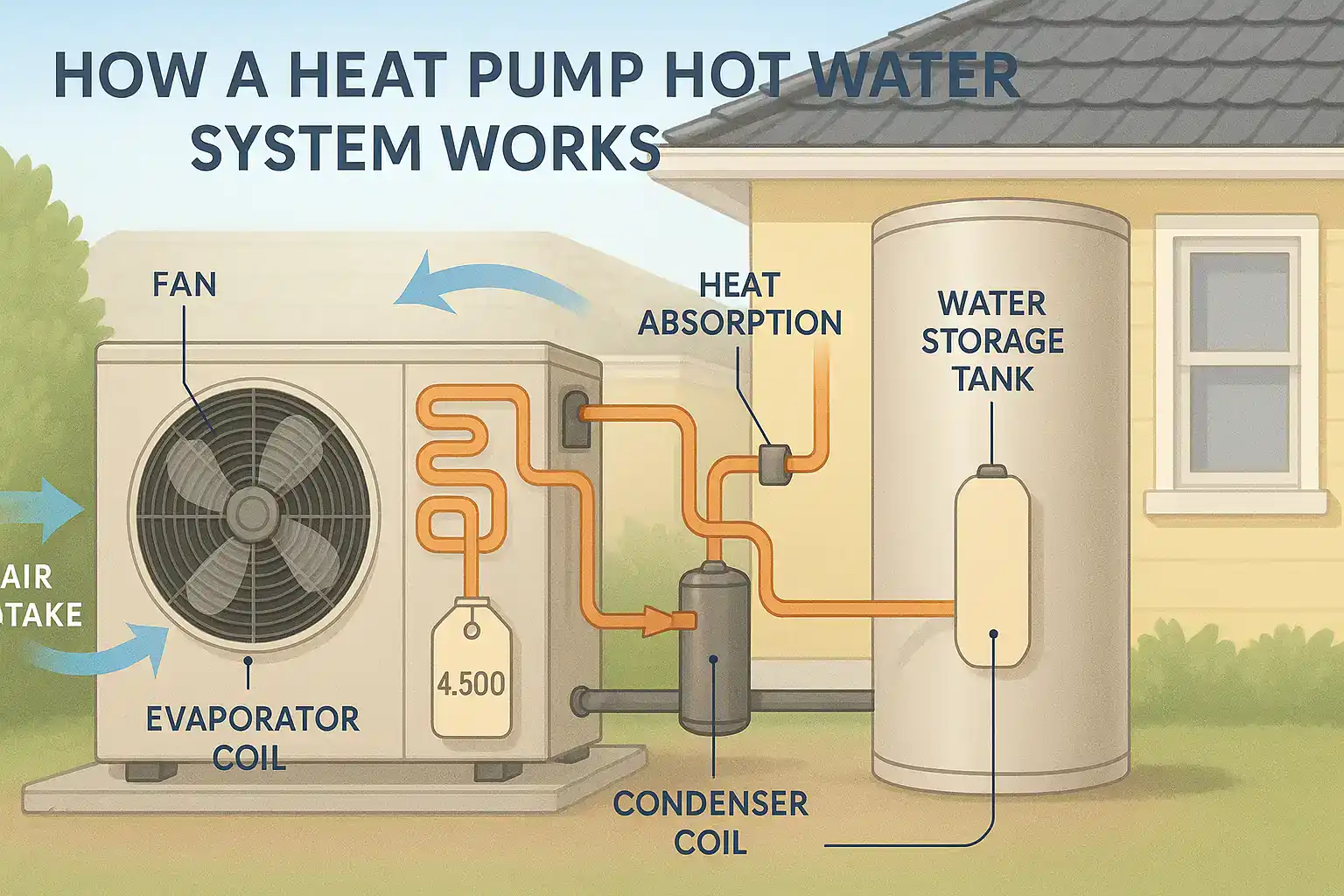If you’re looking to cut your energy bills and lower your carbon footprint, you’ve probably heard about heat pump hot water systems. But how do they actually work?
In simple terms, a heat pump hot water system works by extracting heat from the surrounding air and transferring it into your water tank — instead of creating heat directly like a traditional electric system.
Think of it like a fridge in reverse: rather than removing heat to cool the inside, it captures heat from the air outside and uses it to warm your water.
What are the main parts of a heat pump hot water system?
A typical heat water pump includes:
- Fan: draws in air from around the unit
- Evaporator coil: contains refrigerant that absorbs heat from the air
- Compressor: increases the temperature of the heated refrigerant gas
- Condenser coil / heat exchanger: transfers the heat into your water tank
- Storage tank: holds the heated water until you need it
All of this runs on electricity — but because it moves heat rather than generates it, it uses much less energy.
Step-by-step: how does it heat your water?
- Air intake: The fan pulls warm air across the evaporator coil.
- Heat absorption: The refrigerant inside the coil absorbs the heat and turns into a warm gas.
- Compression: The compressor squeezes this gas, making it even hotter.
- Heat transfer: The hot refrigerant gas passes through a heat exchanger, warming the water inside your storage tank.
- Cooling & cycle repeat: The refrigerant cools back into a liquid and cycles back to absorb more heat.
This process repeats automatically whenever your thermostat senses the water temperature has dropped.
Why is this process energy efficient?
Because the system moves existing heat rather than making it directly, it typically uses 60–75% less electricity than a traditional electric storage system.
For every 1 kW of power consumed by the compressor and fan, a heat pump can deliver around 3–4 kW of heat into your water.
Do heat pumps still work in winter?
Yes — but performance can be affected if outside air temperature drops below about 5°C.
Many modern systems include an electric backup element (booster) that turns on automatically in very cold conditions, so you always have hot water.
In cities like Adelaide, where winter temperatures rarely get extremely low, heat pumps work very efficiently year-round.
How long does it take to heat a full tank?
It depends on:
- The size of your tank (e.g. 250L vs 315L)
- Outside air temperature
- The system’s heating capacity
Typically, it can take 2–4 hours to heat a full tank from cold, although with good insulation, most systems only need to top up during normal use.
Can you combine a heat pump with solar power?
Absolutely — and many homeowners do.
Using your rooftop solar PV system to power your heat pump during the day can make your hot water nearly free when the sun is shining.
This combination is especially popular in Adelaide and other sunny Australian cities.
What makes a heat pump different from solar hot water?
- Solar hot water systems: Use roof-mounted collectors to directly heat water with sunlight.
- Heat pump systems: Use air temperature, so they still heat water at night or on cloudy days.
Both reduce energy bills, but heat pumps can work 24/7.
Do heat pumps need regular maintenance?
Yes — but usually just a yearly service check to:
- Inspect and clean filters and coils
- Check refrigerant pressure and compressor operation
- Ensure valves and electrical components are in good shape
Regular servicing helps your system last longer (often 10–15 years).
Need help choosing or installing?
At SA Hot Water, we help Adelaide homeowners find the right heat pump for their home, usage and climate.
Our licensed team handles everything from advice to professional installation.
For details, visit our page on heat water pump.
FAQ: How does a heat pump hot water system work?
Does it work at night?
Yes — it uses air heat, not sunlight, so it can heat water any time.
Will it work indoors?
Usually no — needs good airflow. Best installed outdoors.
Is it noisy?
About as loud as a fridge (40–55 decibels).
Does it heat water instantly?
No — it fills a storage tank. But keeps water hot and ready.
How long does a heat pump system last?
Typically 10–15 years with proper maintenance.

